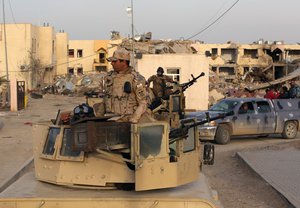IDPH Recognizes Leslie Livett For Excellence In Pediatric Care (Illinois Department of Public Health)
Edit Public Technologies 20 May 2016
- The Illinois Department of Public Health (IDPH) and the Illinois Emergency Medical Services for Children (EMSC) program are honoring Leslie Livett, R.N., M.S., the EMS/Trauma Nurse Coordinator at ... 'Leslie Livett is a recognized leader in trauma services with more than 30 years of emergency nursing and trauma experience,' said IDPH Director Nirav D....
Fairview Park Hospital Celebrates Emergency Medical Services (EMS) Appreciation Week (Dublin-Laurens County Chamber of Commerce)
Edit Public Technologies 19 May 2016
(Source. Dublin-Laurens County Chamber of Commerce). Media Contact.. Lindsay Black. VP, Marketing ... Emergency Medical Services (EMS) Appreciation Week ... Access to quality emergency care dramatically improves the survival and recovery rate of those who experience sudden illness or injury. EMS providers consist of emergency physicians, emergency nurses, emergency medical technicians, paramedics, firefighters, educators, and administrators ... ..P.....
National Emergency Medical Services Week is May 15-21 (Henry County Fire Department)
Edit Public Technologies 18 May 2016Male nurses say there are many reasons to love their job
Edit The National 15 May 2016
ABU DHABI // A family history of nursing inspired Mark Fielding to pursue the career path himself and he urged other men not to be "fooled by the image of bedpans and blood pressures" ... "Nursing is dynamic, autonomous and one of the most respected professions in the world ... "Positions such as critical care, emergency nursing, information technology and advanced practice nursing all have a greater appeal to men," he said....
Male nurses say there's many reasons to love their job
Edit The National 14 May 2016
ABU DHABI // A family history of nursing inspired Mark Fielding to pursue the career path himself and he urged other men not to be "fooled by the image of bedpans and blood pressures" ... "Nursing is dynamic, autonomous and one of the most respected professions in the world ... "Positions such as critical care, emergency nursing, information technology and advanced practice nursing all have a greater appeal to men," he said....
E-News From Congressman Murphy (Tim Murphy)
Edit Public Technologies 14 May 2016
This week, emergency nurses from across the country came to Capitol Hill as part of the Emergency Nurses Association(ENA)advocacy week ... Emergency nurses are pushing for passage of legislation that directly impacts their field of care, like serious mental illness, which is why they have formally endorsed Murphy's landmark bill H.R ... To share your thoughts on the Emergency Nurses Association and mental health, please click here....
EMERGENCY MEDICAL SERVICES WEEK (The Office of the Governor of the State of North Carolina)
Edit Public Technologies 14 May 2016
WHEREAS, emergency medical services are a vital public service; and ... WHEREAS, the North Carolina emergency medical services system consists of 40,000 emergency medical dispatchers, first responders, emergency medical technicians, paramedics, firefighters, educators, administrators, emergency nurses, emergency physicians, and others; and ... Original documenthttp.//governor.nc.gov/document/emergency-medical-services-week....
May 12, 2016 - Gov. Jerry Brown Makes Appointment to California Commission on Emergency Medical Services [pdf] (EMSA - Emergency Medical Services Authority)
Edit Public Technologies 12 May 2016
Snyder has been program manager of emergency preparedness at PIH Health Hospital, Whittier since 2009, where she has held several positions since 2003, including educator and staff nurse for the Emergency Department. She was a charge nurse in the White Memorial Medical Center Emergency ... Snyder is a member of the Emergency Nurses Association....
Dr. Nancy Edwards to receive U of L Honorary Degree (University of Lethbridge)
Edit Public Technologies 12 May 2016
The University of Lethbridge is pleased to announce the second of its 2016 Honorary Degree recipients - esteemed nursing educator Dr ... An esteemed nursing educator, Dr ... Nancy Edwards began her career as a staff nurse in pediatric and emergency nursing ... examining the role of nurses in policy for HIV and AIDS in Jamaica, Uganda, Kenya and South Africa....
Top executives are dropping like flies at dangerous city hospital
Edit New York Post 11 May 2016
Three more top executives are leaving troubled Coney Island Hospital, The Post has learned ... The departures come just two months after four other high-level employees were reassigned or left following a Feb. 1 Emergency Room incident in which a patient died after being misdiagnosed ... John Maese, Chief Nursing Officer Terry Mancher and Emergency Nursing Director Marie Longo all left following the disturbing emergency-room incident....
UMW Students Receive Awards of Excellence (University of Mary Washington)
Edit Public Technologies 11 May 2016
(Source. University of Mary Washington). University of Mary Washington students were honored for outstanding achievements at recent awards programs. Jenna Steele was named Female Athlete of the Year;. Haley Kane was named Female Scholar-Athlete of the Year; ... Department Awards ... Taylor White, Emil R ... Kenna B ... Loyd, Emerging Nurse Leader Award; ... Brantley, Highest GPA Award in Nursing; ... Singh, Professional Excellence in Nursing Practice Award;....
Ashland University to Graduate its First Doctor of Nursing Practice Student (Ashland University)
Edit Public Technologies 09 May 2016
Schneider, whose background is in critical care, emergency nursing and flight nursing, is certified as a Family and Acute Care Nurse Practitioner as well as critical care nursing ... Schneider currently works as an Advanced Practice Registered Nurse in the emergency room at University Hospital's Samaritan Medical Center in Ashland and Knox Community Hospital in Mount Vernon....
- 1
- 2
- 3
- 4
- 5
- Next page »








